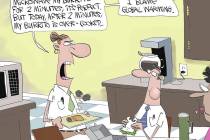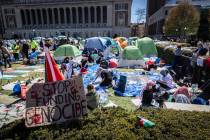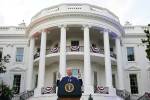Back to the old two-party shell game
And so another election has come and gone. Nearly every concerned voter can be expected to emerge from the tumult in a state of adrenaline depletion: exuberance mixed with a few lingering doubts over the victory of a favored candidate, puzzlement if not something closer to bereavement over the triumph of some corrupt potentate over a well-meaning soul.
And thus we are successfully diverted, again, from thinking about the really important stuff on which we got to cast no meaningful ballot, again.
Which of your votes would have had the effect of closing the Federal Reserve -- a cabal of private bankers allowed to manipulate the nation's currency and economy in ways that can't work out well?
Which vote would have compelled Congress to go back to setting the value of the paper dollar as a fixed weight of gold or silver, or both, easily redeemable in metal on demand -- as instructed to do by the Constitution they swore to "protect and defend"?
Such an act, of course, would immediately demonstrate the 2010 "dollar" is now worth something between a penny and four cents, compared to the 1930 dollar, while having the enormously beneficial effect of preventing the government -- or the Fed, actually -- from ginning up hundreds of millions of new paper or electronic "dollars" out of thin air and using them to buy its own debt, an "eating your own foot to keep from starving" scheme that will have the effect of devaluing the dollars in our savings and investment accounts till they pour through our hands like water through a sieve.
What, that's a far-fetched prediction? The Federal Reserve Board announced Wednesday it's going to do just that.
Which vote you cast Tuesday could have had the likely result of slashing the budget of the Department of War (If it's really the "Department of Defense," why do we need a separate "Department of Homeland Security"?) by at least 80 percent, bringing our troops home from all the ongoing foreign wars and occupations that so benefit our tax-fattened Military-Industrial Complex?
In theory, a few of the Libertarian and Independent American candidates on the ballot Tuesday -- the ones who drew about 1 percent of the vote each -- might at least have broached these subjects, as we whistle our merry way down the road to a worthless currency and blood in the streets. But of course a vote for any such candidate would not be "serious," because they can't be elected.
Why can't they be elected? Because they get no media coverage, because they have no funds. And no one will fund them because they get no media coverage because they aren't "serious" candidates, because they haven't been able to raise, in advance, bribes amounting to at least ten times the annual salary of the office they seek.
But at least Republicans -- the "new" tea party Republicans, not the bad old "go-along" Republicans -- gained a lot of seats, so now they'll really really cut taxes and downsize government, right?
Um ... no. Look at Nevada, where a majority of voters bought the endless, droning, $100 million refrain that Sharron Angle, whose early (and quickly withdrawn) proposals to trim back a few federal agencies were really pathetically modest, was "radical, scary, dangerous, pathological."
(For a more comprehensive plan, read Larry Elder's Nov. 5 column in this space. See anyone running in terror?)
A majority of Nevadans instead voted for 70-year-old incumbent Harry Reid, facilitator of the Obama-Pelosi-Schumer agenda, the tired old fixer who promised to keep their government-union paychecks or pension checks or various forms of welfare checks flowing, even if they're now denominated in "dollars" that more closely resemble French revolutionary "assignats" -- shares in the estates and 401(k)s and pension funds of the "greedy landed classes" which the current regime promises to seize and divvy up as soon as it proves necessary and convenient.
In the face of such a rebuff, to the mere proposal that we get rid of or partially privatize a few of the silliest and most counterproductive federal departments (Education and Energy, perhaps the EPA), you expect Republicans to now commit electoral suicide by slashing actual spending anywhere?
Besides, while the hatred of capitalism, profit and the productive class cradled in the bosoms of Beltway bureaucrats should not be underestimated, the Northern Virginia-based Institute for Justice revealed in a series of eight new reports released Oct. 26 that one of the principal obstacles to creating new jobs and entrepreneurial activity is the complex maze of regulations imposed on small businesses not by the federals, but by our own city and state bureaucrats.
In fact, such bureaucrats are parasites on private job growth in two ways: first, simply by drawing sustenance from taxes on the businesses they regulate, eating funds that could otherwise be used to hire a private worker, but second, by actively harming the very host businesses on which they feed.
IJ's "city studies" are filled with real-world examples:
In Chicago, not only is making food for commercial purposes in a home-based kitchen illegal, but an exhaustive review of the layers upon layers of regulations, inspections and ongoing reporting requirements at both the city and state levels for prospective food-service entrepreneurs would take dozens of attorney hours and cost the would-be entrepreneur as much as $25,000, the IJ estimates.
(Such regulations now even prevent blind newsstand operators from selling their customers plastic-wrapped brownies baked by their own moms in the pre-dawn hours each morning.)
In Los Angeles, to operate a used bookstore, the government demands that the owner get a permit from the police; record the personal information of everyone who brings in books for exchange or resale, including their names, addresses and book titles; and make this information available to the police. In some cases, the bookstore owner even has to thumbprint patrons who bring in books and file daily reports with the police. To buy and sell books.
Chip Mellor, president and general counsel of the Institute for Justice, says "If the nation is looking to the federal government to create jobs in America, it is looking in the wrong place. If we want to grow our economy, we must remove government-imposed barriers to honest enterprise at the city and state levels."
What a coincidence, then, that most of the jobs saved by the Obama regime's "stimulus" handouts, to date, have been unionized, Democrat-voting, government jobs ... including those of the dreaded goons in charge of local zoning and regulatory enforcement.
And you got to pay for it.
Vin Suprynowicz is assistant editorial page editor of the Review-Journal, and author of "The Black Arrow." See www.vinsuprynowicz.com.























